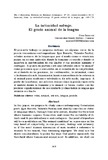| dc.rights.license | http://creativecommons.org/licenses/by-nc-sa/3.0/ve/ | |
| dc.contributor.author | Saraceni, Gina | |
| dc.date.accessioned | 2013-01-15T14:13:17Z | |
| dc.date.available | 2013-01-15T14:13:17Z | |
| dc.date.issued | 2013-01-15T14:13:17Z | |
| dc.identifier.issn | 1315-8392 | |
| dc.identifier.uri | http://www.saber.ula.ve/handle/123456789/36303 | |
| dc.description.abstract | El presente trabajo se propone rastrear, en algunas voces de la
poesía venezolana contemporánea (Igor Barreto, Yolanda Pantin),
estados menores de la lengua que, por el modo como se enuncian,
ponen en escena umbrales donde lo humano se excede y donde se
muestra la inestabilidad de sus límites y sus posibles alianzas y
contagios. El punto de partida será una refl exión sobre “lo animal”
como presencia que se encuentra en el corazón de la subjetividad,
en el ámbito de las pasiones, los sentimientos, la intimidad, como
si la dimensión más humana del hombre necesitara de la referencia
al animal para nombrarse volviéndose, de este modo, impropio. A
partir de lo anterior, me interesa revisar cómo la poesía representa
el umbral donde lo humano y lo animal se tocan, cuáles son las
posibles signifi caciones de ese contacto y cómo habla la lengua que
enuncia ese límite. | es_VE |
| dc.language.iso | es | es_VE |
| dc.rights | info:eu-repo/semantics/openAccess | |
| dc.subject | Vida | es_VE |
| dc.subject | Animal | es_VE |
| dc.subject | Exceso | es_VE |
| dc.subject | Lengua | es_VE |
| dc.subject | Poesía | es_VE |
| dc.title | La intimidad salvaje. El grado animal de la lengua | es_VE |
| dc.title.alternative | Wild Intimacy. The animal dimension of language | es_VE |
| dc.type | info:eu-repo/semantics/article | |
| dc.description.abstract1 | In this paper, we propose to study some contemporary Venezuelan
poets (Igor Barreto, Yolanda Pantin) and identify some lesser states
of language which, through their articulation, display the threshold
where humans surpass themselves and reveal the instability of its
limits and its possible alliances and contagions. Our point of departure
will be a meditation on “the animal condition” as a presence in the
very heart of subjectivity, in our passions, feelings and intimacy,
as if the most human dimension of men needed a reference to
animals to be named, thus becoming improper. We shall use the
above considerations to probe the ways that poetry represents the
threshold where human and animal meet. In addition, we shall see the possible meanings of this contact and the nature of the language
that articulates this limit. | es_VE |
| dc.description.colacion | 163-179 | es_VE |
| dc.description.email | marea132000@yahoo.com | es_VE |
| dc.description.frecuencia | Anual | |
| dc.identifier.depositolegal | PP89-0023 | |
| dc.subject.dependencia | Maestría en Literatura Iberoamericana | es_VE |
| dc.subject.facultad | Facultad de Humanidades y Educación | es_VE |
| dc.subject.keywords | Life | es_VE |
| dc.subject.keywords | Animal | es_VE |
| dc.subject.keywords | Surpass | es_VE |
| dc.subject.keywords | Language | es_VE |
| dc.subject.keywords | Poetry | es_VE |
| dc.subject.publicacionelectronica | Voz y Escritura. Revista de Estudios Literarios | |
| dc.subject.seccion | Voz y Escritura. Revista de Estudios Literarios: Artículos | es_VE |
| dc.subject.thematiccategory | Artes y Humanidades | es_VE |
| dc.subject.tipo | Revistas | es_VE |
| dc.type.media | Texto | es_VE |


